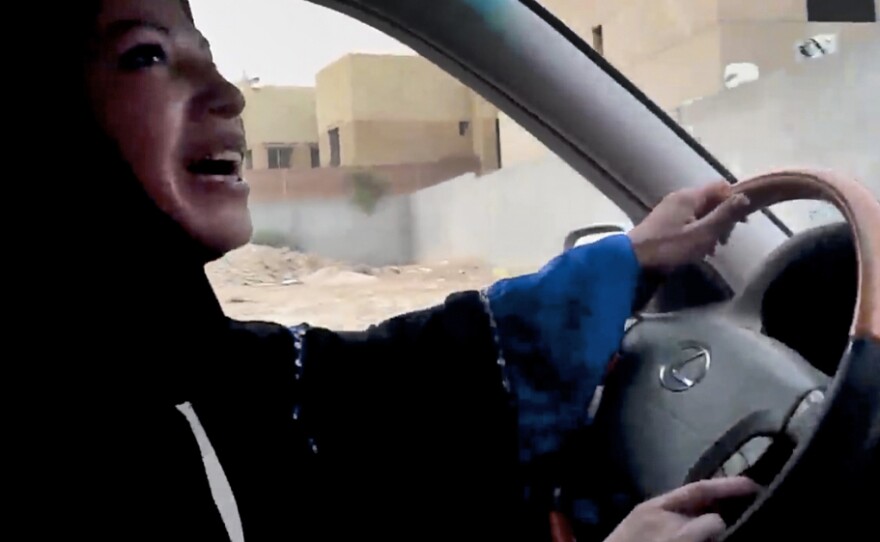Saudi women are getting conflicting messages from their government about whether it intends to expand their rights.
They received a boost from King Abdullah, who pledged to give them more political power in the coming years. But new Crown Prince Nayef bin Abdel-Aziz Al Saud is known for his opposition to women's rights.
Such mixed messages stir up hope, fear and frustration. Several Saudi women tell NPR they simply want a say in how they live.
Tug-Of-War: Women In The Middle
Even finding a public place where they can meet with a reporter is a struggle. They are kicked out of a Starbucks because it is prayer time, when shops must close. A nearby hotel lobby won't work, either, because there are men inside. Saudi women lingering in the same space as men could trigger a visit by the dreaded mutawa, or religious police, who enforce a strict segregation of the sexes in public spaces.
So the women decide to gather in the reporter's small hotel room. But even that proves a challenge, as they search for an elevator with no men inside.
Nuha al-Suleiman says such obstacles take the fun out of going anywhere.
"I feel just frustrated when I go out because I have to find my driver. I will have to stay in some places. I cannot walk in all streets," she says. "There are religious police everywhere, and they can complain about anything, so I just prefer staying home."
The 28-year-old businesswoman and other Saudi women interviewed for this story say they are tired of waiting for rights most other women around the world take for granted.
The mixed signals especially bother them. In a historic speech in September, Abdullah pledged to add women to his all-male advisory council and allow them to take part in the next municipal elections. Two days later, a court in the port city of Jeddah sentenced a young mother to 10 lashes for driving a car.
The king later set the sentence aside. Even so, analysts say it was an unusually harsh punishment for violating a female-driving ban that isn't enshrined in law.
Ruba, a 21-year-old university student, calls the sentence shameful. She believes it was a backlash against the decision to offer women political rights. Ruba, like several women in this story, asked that only her first name be used to protect her family.
"Of course, it felt like a game of tug-of-war between the liberals and the conservatives," she says. "When the liberals pulled harder and won, the conservatives pulled even harder.
"So it just felt like women were that rope between the two parties."
'Society Is Ready'
Nevertheless, Saudi women these days are going after their rights like never before, says Fawzia al-Bakr, a 45-year-old Saudi columnist and college professor who defied the driving ban in 1990.
"I remember when I [went] to any gathering, or social gathering or the family, everybody [looked] at you as odd — totally odd — because you were asking for something that is against the religion and against the social ... code and all that," she says. "Now ... I can actually talk to my students about things. It's an interesting time."
She credits greater educational and work opportunities for their empowerment — that, and the Internet, which has made it easier for women to network and draw attention to their efforts.
Activist Manal al-Sharif posted a video of herself driving in the city of Khobar in May, leading to her arrest. Supporters quickly created a Facebook page for her and demanded that she be released.
Public pressure and an apology by Sharif, who also signed a pledge that she wouldn't drive again, led authorities to release her 10 days later.
Still, the news spurred other Saudi women to get behind the wheel, including Rasha Alduwisi.
Alduwisi, a 30-year-old banker, says she's tired of paying one-third of her salary to drivers to take her to and from work.
"The society is more accepting now, that's for sure," she says. "Like, you can see people waving to you and giving you the thumbs up and all that. ... That tells me society is ready."
It isn't as if Saudi women have any choice but to drive, adds Mohammed Fahad al-Qahtani, who heads the Saudi Civil and Political Rights Association in Riyadh. He says a growing number are working or going to school, and the kingdom has no public transit system, making cars the only viable option.
Qahtani explains that the ban is hard on men, too. They often have to play chauffeur, as he does for his wife and children.
"I drive my kids in the morning, and I drive her to work, too, and I collect them in the afternoon," he says. "Can you imagine this busy schedule, and sometimes I'm the family driver, too, at night?
"So when I travel — and I do, I travel a lot — she'll be alone standing in the street with her kids, flagging a taxi to take them, and they are not reliable."
Beyond Driving
Ending the driving ban is not the only change many Saudi women want. Some say it's more important for the Saudi government to establish an age of majority for women.
Under current Saudi law, a woman is the dependent of a male relative, be he her father, brother, husband or even her son. She always needs that male guardian's permission to do almost anything outside the home throughout her life.
She can even be married off without being told, says Sarah, a 23-year-old marketing specialist.
"When we get rid of that law, I will be able to tell you that Saudi Arabia is headed toward change," she says.
Copyright 2022 NPR. To see more, visit https://www.npr.org. 9(MDAzMjM2NDYzMDEyMzc1Njk5NjAxNzY3OQ001))







